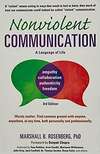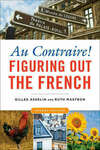Resources
Aura, the all-in-one App for mental wellness and sleep

I am pleased to offer you a free one-month trial of Aura, the all-in-one App for mental wellness and sleep, to which I am proud to contribute.
Living abroad
- "Au Contraire! Figuring Out the French", by Gilles Asselin, Ruth Mastron, (Published by Intercultural Press )
Written for anyone interacting with the French - tourists, businesspeople, international students, Francophiles - Au Contraire! offers a perceptive understanding of French cultural beliefs, assumptions and attitudes, along with practical advice on building strong personal and professional relationships with the French. Addressing issues like friendship, politics, work, education and romance, bilingual and bi cultural authors Asselin and Mastron draw upon their own experiences as consultants and trainers, as well as those of students and professionals, giving readers a complete - and compelling - look at French culture.
- Resilient Traveling - Managing Stress & Enhancing Your Experience Abroad: tools,insights and stories proposed by the University of Michigan
Tobacco
- Tabac Info Service, a service of the agence Santé publique France (in French)
- Addict AIDE, information about addictions (in French)
Alcohol
- Alcool Info Service, a service of the agence Santé publique France (in French)
- Addict AIDE, information about addictions (in French)
- Aide Alcool (in French)
Sleeping disorders
- Institut National du Sommeil et de la Vigilance: the mission of this association is to raise awareness, inform and educate about sleeping disorders (in French)
- Les Carnets du Sommeil®: a collection of thematic brochures (in French) about sleep published by the Institut National du Sommeil et de la Vigilance
- Réseau Morphée: a health network dedicated to supporting people with chronicle sleeping disorders
- "L'agenda du sommeil" published by the Réseau Morphée: this tool enables you to analyse the quality and quantity of seep you are getting over a period of time
Women
- Tel No 39 19: French national help line for women victim of violence, their circle of acquaintances and professionals. Calls are anonymous and free 7 days a week, from 9:00 am to 10:00pm Monday thru Friday and 9:00 am to 6:00 pm on Saturday, Sunday and Bank Holidays
- Maison des Femmes Thérèse Clerc: a feminist association fighting for women's rights, emancipation, and against acts of violence towards women (Montreuil)
Children & Adolescents
- The Robert Debré Hospital and its InovAND center (Excellence center for neurodevelopmental disorders): in order to better support families in their daily lives, the child and adolescent psychiatry department shares its scientific publications and practical information sheets on various themes: relaxation, managing stress, positive parentality, parental, burn out , fostering interactions among sibblings, supporting adolescents to help them reduce their consumption of tobbaco, or cannabis, scarification, ADHD... (in English)
- e-enfance: to enable children and adolescents to use Internet and cell phones with a maximum of security
- Net Ecoute: national helpline for children and adolescents facing problems with their use of digital devices. Tel 0800 200 000 (free service and call. Monday to Friday 9:00 am to 8:00 pm, Saturday 9:00 am to 6:00 pm)
- Fil Sante Jeunes: for children and young adults age 12 to 25 ans. This service answers questions about health, love, sex, psychological discomfort. Tel 0 80 235 236 (anonymus and free call) or by chat on their site.
- Tête à Tête: a location where you can find information and advice for adolescents and young adults about love life, sexuality, problems with drugs, wellbeing /illbeing, violence (located in the Rosny 2 mall in Rosny-sous-Bois)
- Non au harcèlement: support in case of child harassment. French national help line 3020 (free service an call) for children, parents and professionals.
- Ecole de parents et des éducateurs:helping parents with support groups, workshops, conferences and a helpline for thos living in Paris and its surroundings. (located in 75011 Paris)
- Inter Service Parents: a helpline for parents with professionals who will listen, advise and council anonymously and confidentially. Tel 01 44 93 44 93 (normal call free from a land line or mobile phone)
- Maison des liens familiaux: family mediation, support for parents, legal advice, meeting point. (75019 Paris)
- Maisons des adolescents: for adolescents and young adults (from age 11-12, to age 18 – 21 or 25 depending on the structure), their close acquaintances (friends, parents, family) and for professionals
- L’École des parents à Vincennes: thematic conferences for parents of young children and/or adolescents. 2020/2021 program
- Permanence Accueil Ecoute Jeunes in Vincennes: free counselling with a psychologist, two Wednesdays per month from 3pm to 6 pm, at the Carré. To make an appointment lecarre@vincennes.fr or 01 71 33 64 40. Planning of next sessions
- Maison de la Prévention - Point écoute jeunes in Fontenay-sous-bois: promotes health and prevents health issues. Welcomes and informs children and parents.
- Enfine: an association to support young people sufffering from food behavioral disorders and their parents. Helpline Tuesday and Thursday 8 pm to 10 pm, Tel 01 40 72 64 44 (call with no added fee); support group, yoga workshop, writing to a psychotherapist, forum.
Other

What is Violent Communication?
If “violent” means acting in ways that result in hurt or harm, then much of how we communicate—judging others, bullying, having racial bias, blaming, finger pointing, discriminating, speaking without listening, criticizing others or ourselves, name-calling, reacting when angry, using political rhetoric, being defensive or judging who’s “good/bad” or what’s “right/wrong” with people—could indeed be called “violent communication.”
What is Nonviolent Communication?
Nonviolent Communication is the integration of four things:
• Consciousness: a set of principles that support living a life of compassion, collaboration, courage, and authenticity
• Language: understanding how words contribute to connection or distance
• Communication: knowing how to ask for what we want, how to hear others even in disagreement, and how to move toward solutions that work for all
• Means of influence: sharing “power with others” rather than using “power over others”
Nonviolent Communication serves our desire to do three things:
• Increase our ability to live with choice, meaning, and connection
• Connect empathically with self and others to have more satisfying relationships
• Sharing of resources so everyone is able to benefit
Content by PuddleDancer Press. Use of content okay with attribution. Please visit www.nonviolentcommunication.com to learn more about Nonviolent Communication.
